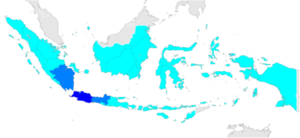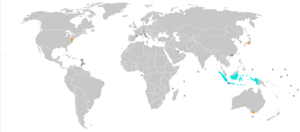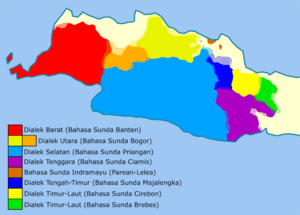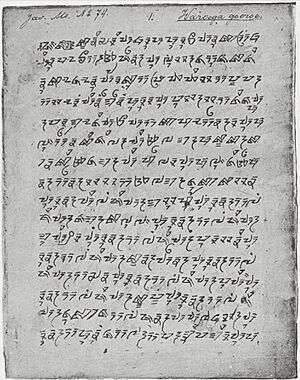Sundanese language facts for kids
Quick facts for kids Sundanese |
||||
|---|---|---|---|---|
| Basa Sunda ᮘᮞ ᮞᮥᮔ᮪ᮓ بَاسَا سُوْندَا |
||||

The word Sunda written in the Sundanese script
|
||||
| Pronunciation | (dialectal) |
|||
| Native to | Indonesia | |||
| Region | West Java, Banten, Jakarta, small parts of western Central Java, and southern Lampung | |||
| Ethnicity |
Sundanese
|
|||
| Native speakers | 32 million (2015)e27 | |||
| Language family |
Austronesian
|
|||
| Early forms: |
Old Sundanese
|
|||
| Standard forms |
Priangan Sundanese
|
|||
| Dialects |
|
|||
| Writing system |
|
|||
| Official status | ||||
| Regulated by | Badan Pengembangan dan Pembinaan Bahasa
Lembaga Basa jeung Sastra Sunda |
|||
| Linguasphere | 31-MFN-a | |||

Areas where most people speak Sundanese
Areas with many Sundanese speakers Areas with some Sundanese speakers |
||||
|
||||
Sundanese (pronounced sun-duh-NEEZ) is a language spoken by about 32 million people, mainly in the western part of the island of Java in Indonesia. The people who speak it are called the Sundanese. They make up about 15% of Indonesia's total population, making Sundanese one of the country's most spoken languages!
Contents
Where Does Sundanese Come From?
Sundanese is part of the Austronesian language family. This is a huge family of languages spoken across a vast area, from Madagascar in Africa to Easter Island in the Pacific Ocean.
Linguists (people who study languages) believe Sundanese is closely related to Malay and other languages spoken on the island of Borneo. They figured this out by noticing that these languages share many similar words.
Who Speaks Sundanese and Where?
Sundanese is mostly spoken in the western part of Java, an area often called Tatar Sunda or Pasundan. It's also spoken in parts of Central Java, like the Brebes and Cilacap regions. This is because ancient Sundanese kingdoms once ruled these areas. You can still find many place names there that come from the Sundanese language.
For hundreds of years, Sundanese was the official language of powerful kingdoms like Tarumanagara, Sunda, and Galuh. During this time, the language was used for everything from government to art and daily life. Many old books and stone carvings were written in an early form of Sundanese.
Today, Sundanese speakers are not just in Java. Many have moved to other parts of Indonesia and even to other countries like Taiwan, Japan, and Australia.
Different Ways of Speaking Sundanese
Like many languages, Sundanese has several dialects. A dialect is a version of a language spoken in a particular area. The main dialects of Sundanese are:
- Western dialect: Spoken in the province of Banten.
- Northern dialect: Spoken in areas like Bogor and the northern coast of West Java.
- Southern (Priangan) dialect: This is the most widely spoken dialect. It's used in cities like Bandung and Tasikmalaya. This is the version of Sundanese that is taught in schools.
- Mid-east dialect: Spoken in places like Cirebon and Majalengka.
- Northeast dialect: Spoken in Kuningan and Brebes.
- Southeast dialect: Spoken in Ciamis and Cilacap.
Even though these dialects sound a bit different, speakers can usually understand each other.
How to Write in Sundanese
The Sundanese language has been written in several different alphabets, or scripts, over the centuries.
- Old Sundanese Script: This was one of the earliest scripts used for the language. It was used to write important old texts on palm leaves.
- Pegon Script: When Islam arrived in the region, a version of the Arabic script called Pegon was used, especially for writing about religion.
- Latin Script: After Europeans came to Indonesia, the Latin alphabet (the same one used for English) became common. Today, most Sundanese books, newspapers, and websites are written in the Latin script.
- Standard Sundanese Script: In recent years, there has been a big effort to bring back the traditional Sundanese script. You can now see it used on road signs and in public places in West Java and Banten.
The Sundanese Latin Alphabet
The modern Sundanese alphabet uses Latin letters. It's mostly phonetic, meaning the letters usually make the same sound. It includes some special letters for sounds not found in English, like é, e, and eu.
Polite vs. Casual: Choosing Your Words
A very interesting feature of Sundanese is its system of speech levels. This means you use different words depending on who you are talking to and how much respect you want to show. It's a way of being polite.
In the past, there were many levels, but today it has been simplified to two main ones:
- Basa Hormat (Respectful Language): This is the polite and formal way to speak. You would use it when talking to older people, teachers, or people you don't know well.
- Basa Loma (Casual Language): This is the everyday, informal language you use with friends and family. Most books and magazines are written in Basa Loma.
For example, if you want to say "read," you would say maca to a friend (loma), but you would say maos to a teacher (hormat). Choosing the right level is an important part of speaking Sundanese correctly.
A Quick Look at Sundanese Grammar
Grammar is the set of rules for how a language works. Here are a few fun facts about Sundanese grammar.
Making Words Plural
In English, we usually add an "-s" to make a word plural (like "cat" becomes "cats"). Sundanese does something different and very cool! It adds a small piece, called an infix, inside the word. The infix is usually -ar-.
For example:
- Budak means "child."
- Barudak means "children." The -ar- is placed after the first letter.
If the word starts with "l" or has an "r" in it, the infix changes to -al-.
- Lumpat means "run."
- Lalumpat means "they run" (plural).
Basic Words
Here are some common words in Sundanese. Notice how some words have a casual (loma) and a polite (lemes) form.
| English | Sundanese (Casual) | Sundanese (Polite) |
|---|---|---|
| eat | dahar | tuang (for others) / neda (for yourself) |
| drink | inum | leueut |
| write | tulis | serat |
| read | maca | maos |
| sit | diuk | linggih (for others) / calik (for yourself) |
| walk | leumpang | nyacat |
Numbers
Learning to count is a great way to start with any language.
| Number | Sundanese |
|---|---|
| 1 | hiji |
| 2 | dua |
| 3 | tilu |
| 4 | opat |
| 5 | lima |
| 6 | genep |
| 7 | tujuh |
| 8 | dalapan |
| 9 | salapan |
| 10 | sapuluh |
| 100 | saratus |
| 1000 | sarébu |
See also
- Sundanese alphabet
- Sundanese (Unicode block)
- Sundanese Wednesday
 | Jewel Prestage |
 | Ella Baker |
 | Fannie Lou Hamer |





